|
|
Click a thumbnail to view more photographs
Phuket Beach Clubs, Restaurants Given Seven Days to Remove Illegal Structures at Surin, Bang Tao, Layan
By Chutima Sidasathian at Surin and Alan Morison Wednesday, June 11, 2014
PHUKET: Beach clubs and restaurants on the foreshore along Phuket's west coast have seven days to remove illegal structures or have them removed by authorities, Phuket Vice Governor Jamleran Tipayapongtada ordered today.
Local Cherng Talay Mayor Ma-Ann Samran, who was with the vice governor today on the Phuket shorefront, said about 30 businesses at Surin had accepted the decision.
The edict has also gone out to 40 businesses on the foreshore at Laypang (the northern stretch of Bang Tao) and 12 more at Layan beach.
It is believed a total of 70 more businesses - mostly restaurants but also possibly resorts - are also going to be targetted at Bang Tao beach.
Governor Jamleran and Mayor Ma-Ann began at Surin today then moved to Laypang (northern Bang Tao), where Lotus Restaurant and other restaurants and beach clubs on the beach side of the road were ordered to be removed.
The deadline of next Tuesday is likely to bring a flood of beach club and restaurant customers to enjoy the final week of what's been a great commercial success for Phuket.
The ruling does not mean the end for beach clubs or restaurants at Surin. But it defines the path that runs virtually the entire length of the beachfront as the do-not-cross neutral zone.
A similar clearance was ordered about eight years ago at Surin. But some of the illegal structures added since have been solid concrete.
At Laypang beach, some of the restaurants have been substantial operations for decades, with the beach clubs relative newcomers.
The authorities moved on today to Layan beach, which Cherng Talay Mayor Ma-Ann also oversees. Twelve businesses there have been ordered to close.
It's not known yet whether the latest arrival, Nikki Beach Club, has been deemed legal or illegal. [A lawyer later called Phuketwan to say Nikki Beach has a chanote title for the property and permission for construction.]
The same clearance order is likely at other beaches along Phuket's west coast, including Nai Harn, Patong and Kamala, where there are similar encroachments.
There is no word yet on whether the beachfronts will be restored to their natural states - the preference for environmentalists, or landscaped to death under concrete.
The Pla restaurant, which has consistently staked a claim to a large part of the Surin beach, is also being told to end its commercial activities on the sand.
A restaurant on the rocks at the southern end of Surin beach is clearly out of bounds. There's still no word yet on the fate of the beach club at the end of the path.
If an imaginary line was extended through the beach club, an infinity pool and much of the rest of the structure would have to be removed, at considerable cost.
The decision by authorities on Surin was followed by a similar crunch at Laypang and Layan, where the foreshore and in some cases the beach itself has been appropriated for commercial purposes.
Bang Tao was believed to be next.
Whether the beaches can be as ''saved'' as some environmentalists would like them to be remains to be seen.
Today's order from the authorities fails to take account of the drawing power of the beach clubs and restaurants to attract visitors to Phuket for its nightlife fun.
And the fact is that although most ''quality'' visitors to Phuket want to see the island kept in a natural state, there is nothing most of them enjoy more than having a meal or a good night out right on the edge of the beach.
|
Comments
Comments have been disabled for this article.

Most, if not all, of these Clubs have large premises on the 'right' side of the road - and they will continue to attract quality tourists, and I am sure that (Catch anyway) will survive. On the beach side of the road - I am also sure that potable bamboo tables and chairs will be acceptable - but not on the actual beach.
Posted by
FrankieV
on
June 11, 2014 11:24
Editor Comment:
Past clearances have removed all structures. If the area was replanted and fenced off to be allowed to regenerate, there would be no speedy return. Best to wait and see.

A good move as long as they take it a step further and massively reduce the number of beach chairs/umbrellas on the beaches. I took my family to Surin Beach one day during last high season and was astounded at how little sand you could actually see. It was row after row of umbrellas all the way to within a few feet of the water. Ridiculous and completely unnecessary. I didn't want to stay there 5 minutes longer.
Posted by
Chris
on
June 11, 2014 11:59
Editor Comment:
Phuket's popularity is the island's largest problem. Preserving that popularity and the beaches and the reefs at the same time is not going to be easy. But it has to be done for Phuket's survival.

For Bangtao - as far as the Lotus restaurant and the new Nikki Beach Club is concerned, I think we will be "waiting and seeing" for many years to come.
Posted by
viper
on
June 11, 2014 12:19
Editor Comment:
The new Nikki Beach Club is actually at Layan. Guesswork doesn't add value, viper. Best wait and see.

ok.now how about the illegal restaurant at the southern end of nai harn beach next to the lagoon.the toilets there pollute the lagoon and cause children to get sick and they get rashes too.
Posted by
Anonymous
on
June 11, 2014 14:14

@ Anonymous, did you read this 'The same clearance order is likely at other beaches along Phuket's west coast, including Nai Harn, Patong and Kamala, where there are similar encroachments.'?
Posted by
stevenl
on
June 11, 2014 14:23

I can't help being in two minds about this as the last paragraph of your article states. There could be a compromise to satisfy what tourists clearly enjoy, but how to do it fairly without the inevitable backhanders coming into play.
Posted by
Tony
on
June 11, 2014 14:57
Editor Comment:
The problem is, as we once asked, do people want two beach clubs or 20? So it became a gold rush for the greedy. The latest photos show some of these expats have only concrete in their hearts and money where their minds should be.

"The latest photos show some of these expats have only concrete in their hearts and money where their minds should be."
What Expats would that be, Ed?
Posted by
viper
on
June 11, 2014 15:14
Editor Comment:
Sorry, I don't hold conversations with vipers.

Let's hope that clearing of illegal premises will also take place at NaiYang Beach - that beach has all but disappeared under concrete.
Posted by
Simon Luttrell
on
June 11, 2014 16:16

Although I myself like to enjoy F&D service on the beach, prefer fine foods and definitely like to party , at the same time I love picture-style and clean beaches and tropical natural landscapes, so ... giving to chose priority, the top rank is given to clean and natural beaches , say, Norther Khao Lak style..
Night entertainment need not to be held on the beach, on the hill above beach; same about bars.
Clean natural beaches are coming first, pls.
I also note that no Phuket beaches would satisfy at least one out of 33 criteria of Blue Flag certification, that is popular in Europe, and covers virtually all aspect of quality beaches.
Blue Flag regulation can easily adopted as a benchmark for Phuket beaches management, and if contains well thought over details about what development is allowed at or near a beach:
http://www.blueflag.org/menu/criteria/beaches/beach-criteria-and-expl-notes-2014
It would be good if Phuket authorities would pay attention to Blue Flag already accrued and tested know-how, translate it into Thai, as many officers involved are not fluent in English, and take it as a basis for discussion on policy draft on management of Phuket beaches.
Posted by
Sue
on
June 11, 2014 17:17
Editor Comment:
The adoption of the Blue Flag system was suggested 12 months ago and perhaps we need to write to the general to have it adopted.

clean up the beaches, the corruption and the pollution... go get 'em!!!! Legal establishments on the other side of the road can sell plenty of drinks and dinners... no need to encroach for $. Some jobs and dirty investment might be lost, but Phuket remains having a 0% unemployment rate... so I do not think people will suffer too much..
Posted by
J
on
June 11, 2014 17:18

so they go portable few tables chairs a stove on wheels pack em up that night everyone happy, permit system limit on right to be there and chair limits all payable to a beach authority if they can manage that without corruption and saturation
Posted by
slickmelb
on
June 11, 2014 17:31
Editor Comment:
That's a compromise, slickmelb. Ain't going to happen.

@Ed
Is there any tool like public petition to get Gen's attention to Blue Flag adoption?
I would happily and readily contribute some of my time and writing efforts on the subject.
De facto adoption of Blue Flag guidelines would be a shortcut to get things done here and with apparently visible results.
Formal certification is not necessary now, but real life action in spirit and letter of BlueFlag is that what matter.
Posted by
Sue
on
June 11, 2014 17:32

Sue, I'm not sure Alan and other readers are as familiar with Blue Flag requirements as you. Maybe you could provide a comparison for the requirements between developing and developed countries and a cost benefit analysis that such an adoption would provide giving consideration to socioeconomic impacts. Maybe limit it to say 12 countries.
Sorry Alan!
Posted by
Manowar
on
June 11, 2014 18:13

@Manowar
You should not disguise your thinly veiled lack of understanding of environmental issues by an expression of an unhealthy emotion of sarcasm.
BlueFlag is a voluntary eco-label, thus it is about environmental targets , not about socioeconomic targets; surely it has its costs and make impact on economy, that should assesses ,but primary target is the environmental one.
You just demonstrated the same ill judgement about environmental issues that those folks who put their business units on Phuket beaches - the kind of judgement that should be exterminated by means of education and proper policy: what *I* will get from cleaner beaches and less tourists, if *today* I can earn my THBs, and that is all what I am concerned.
Environmental policy and its enforcement doesn't come from voluntary adoption by agents of such ill judgement, by the mean of coercing them to policies that should be drafted keeping those targets in mind.
BlueFlag principal aim is against so degradation of environment by uncontrolled and ill planned tourism.
As environmental target it goes along with environmental goals paradigms and how such goals interact with socioeconomic goals.
As a result of implementation environmental policies there are can be decrease in some socioeconomic inductors , or there can be some positive feedback on them - a particular situation has to be evaluated for the impact.
Publication "Awards for Improving the Coastal Environment:The example of the Blue Flag " Chapter 2 "Coastal Tourism:economic relevance and environmental implications " provides general discussion on the topic as in a header of the chapter, but Chapter 7 "Experiences from New Non-European Countries" answers your questions in part about adoption of experience of BlueFlagi by developing countries , among them in Mexico, Dominican Republic Brazil, Turkey, South Africa, (and Chapter 6 there is a summary on impact in a few European countries):
http://www.blueflag.org/materiale/publication-downloads/blueflagmanual
There is study on socioeconomic impact of BF in South Africa:
"Serena Lucrezi and Peet van der Merwe (2014) Beachgoers' Awareness and Evaluation of the Blue Flag Award in South Africa. Journal of Coastal Research In-Press."
http://www.jcronline.org/doi/pdf/10.2112/JCOASTRES-D-13-00159.1
As well on Mauritius:
"Towards Introducing The Blue Flag Eco-Label In SIDS: The Case Of Mauritius"
http://www.irfd.org/events/wfsids/virtual/papers/sids_rughooputh3.pdf
For Spain there is a whole book on a topic: Lisa Sitnikow A study of eco-labelling in Spain and tourism decision making: The German experience
A study for narrower socioeconomic impact for Turkey:
"MANAGERS??? CONCERNS TO USE BLUE FLAG AS A MARKETING TOOL IN TOURISM INDUSTRY IN TURKEY"
http://asbbs.org/files/ASBBS2013/PDF/E/Eser_Ilgaz(P448-456).pdf
Study for Ireland: http://www.environ.ie/en/Environment/Water/PublicationsDocuments/FileDownLoad,1560,en.pdf
Study for Portugal/Spain:
"The impact of water quality changes on the socio-economic system of the Guadiana Estuary: an assessment of management options"
http://www.ecologyandsociety.org/vol17/iss3/art38/ES-2012-5318.pdf
Summary study for Carribean
http://www.inecc.gob.mx/descargas/dgipea/sem_cert_amb_tur_pon_04_hynam.pdf
BlueFlag is also about marinas.
There is a study on socioeconomic impact of BlueFlag on Bahamas, that is a developing coy try by IMF definition, produced by regional organization IWCAM (Integrated Watershed and Coastal Area Management):
http://iwcam.org/documents/gef-iwcam-project-knowledge-documents/gef-iwcam-demonstration-project-case-studies/case-study-of-the-gef-iwcam-bahamas-andros-demonstration-project/at_download/file
There is a summary presentation by IWCAM on US Virgin Islands on socioeconomic impact of an adoption of BlueFlag:
http://iwcam.org/documents/gef-iwcam-project-knowledge-documents/gef-iwcam-demonstration-project-case-studies/case-study-of-the-gef-iwcam-bahamas-andros-demonstration-project/at_download/file
BlueFlag has been born in Europe as complimentary to EU Bathing Water Directive, that currently is promulgated in European Economic Area, i.e.EU+Iceland,Norway,Liechtenstein.
There were studies on impact assessment of if when it was lately amended, all being relevant to Blue Flag, as BlueFlag encompasses that Directive major requirements, e.g. a study produced by UK:
http://archive.defra.gov.uk/environment/quality/water/waterquality/bathing/documents/partial-ria.pdf
Amended Bathing Water Directive is integrated now with Water Framework Directive, there are various impact studies have been done, incl. on socioeconomic landscape.
BlueFlag is currently adopted in ca.50 countries.
Posted by
Sue
on
June 11, 2014 22:15
Editor Comment:
A simple ''yes'' or ''no'' seems not to be your style, Sue.

@Ed
Everyone has his own style..
As the topic of the article is about development of coastal area, let me cite most relevant to this criteria of BlueFlag, and for most appropriate details as well.
These criteria comprehensively point to what is wrong with Phuket beaches:
Criterion 12. The local authority/beach operator should establish a beach management committee.
The beach management committee should be charged with ensuring compliance with all environmental management criteria, including Marine Protected Areas requirements if appropriate. The committee should consist of all relevant stakeholders at the local level. Relevant stakeholders could be a local authority representative, hotel manager, beach manager, lifeguard, educational representative, local NGO, and other stakeholders such as community representatives, special user groups, Marine Protected Area representative, etc. The beach management committee should co-operate with and support the local authority/beach operator and could institute environmental management systems and conduct environmental audits of the beach and its facilities. Where appropriate, a beach management committee may operate over a number of Blue Flag beaches within a local authority or an area/region, i.e. there is no need for a separate beach management committee for each individual Blue Flag beach.
Criterion 13. The local authority/beach operator must comply with all regulations affecting the location and operation of the beach.
Regulations pertaining to issues relating to coastal zone planning, environmental management, waste-water legislation, environmental legislation, and others must be met for the beach to receive and maintain Blue Flag status. The applicant must assure that the facilities and activities under its responsibility comply with these guidelines and/or regulations. The management of the beach location, facilities, beach operation and immediate surrounding area must comply with official development plans and planning regulations. The legislation may include regulations for land-use planning, sewage/industrial waste effluent discharge, environmental health regulations, conservation plans, operations licenses and permits, etc. The location of facilities and use of the beach area and its vicinity must be subject to planning guidelines. This includes environmental impact assessments. At the time of application for Blue Flag status, the applicant authority must provide written evidence from the planning department that all buildings on the beach meet local building regulations. Existing beach facilities, construction and other use of the beach and its vicinity must be in compliance with laws regulating the use of the coastal zone or freshwater areas, including environmental conservation regulations. The back beach area including dunes, paths, and parking areas must be properly maintained according to coastal zone management principles.
Criterion 19. An adequate number of toilet or restroom facilities must be provided.
Criterion 21. The toilet or restroom facilities must have controlled sewage disposal.
Sewage or effluent from the toilets must not enter the ground or the water untreated. In villages, communities, or in a municipality with sewage treatment facilities, the toilet facilities must be connected to the municipal sewer. For facilities located outside of areas serviced by the municipal sewage system and/or remotely located beaches, individual treatment and regularly emptied holding tanks that prevent untreated sewage, effluent or seepage from entering the ground or the water - and which do not adversely affect the environment - are acceptable.
Criterion 22. On the beach there will be no unauthorised camping or driving and no dumping.
Criterion 24. All buildings and beach equipment must be properly maintained
Consideration should be given to the appearance of buildings and structures at the beach. They should be well integrated within the natural and built environment, should adhere to design standards and meet environmental and aesthetic requirements. Equipment on the beach includes facilities or services not discussed in any other criteria, e.g. playgrounds and piers. Equipment must be regularly maintained and checked in order to ensure that it is safe to use. Consideration should be given to: the cleanliness of equipment, its condition, the environmental effects of paint and other materials used for maintaining the equipment/buildings and any potential risk associated with its deterioration and malfunction. Wherever possible, environmentally friendly products should be used. To prevent access by the public, all construction work or hazardous structures must be fenced off. In the event that construction takes place during the Blue Flag season, all Blue Flag criteria must be met during the period of the construction. Also, the construction activities should not impact on beach users
Criterion 29. Emergency plans to cope with pollution risks must be in place.
The emergency plan should cover a clearly identified procedure, facilitating efficiency in the case of an emergency. An emergency could result from oil spills, hazardous/toxic waste spills entering the beach from the sea, discharge of storm water, hurricanes, algal blooms that could be dangerous, etc. An emergency in this context would be defined as an event which leads to a large scale impact on the beach or bathing water.
Criterion 30. There must be management of different users and uses of the beach so as to prevent conflicts and accidents.
Posted by
Sue
on
June 12, 2014 06:16
Editor Comment:
Phuket's ''Green Flag'' was so much simpler. Only one rule: ''If you see commercial advantages in taking over public space for private profit, go for it.''

Owners of those illegal structures actually can easily manage to obtain a kind if court's injunction against demolition, there is pretty low threshold for it, and file some frivolous claim why their structure should not be demolished - and then wait until a final verdict 10 years..
Posted by
Sue
on
June 12, 2014 06:32
Editor Comment:
In normal times, that would be the case. Under a coup command? There are no certainties.

Alan, I can only apologise. Who didn't see that coming!
Posted by
Manowar
on
June 12, 2014 08:25

With all these flags adopted on Phuket beaches the surf life savers will be battling for space for their red and yellows.
Any one interested in setting up a flag pole business?
Posted by
Manowar
on
June 12, 2014 08:32

@Manowar
BlueFlag is of holistic approach and covers *all* aspects of beach management! incl.all safety issues incl. concerns that you hinted to.
It provides as a result not like now on Phuket beaches - a mess and confusion with marking a beach strip with flags and placing other info, that to big extent is absolutely meaningless and just imitation of useful activity, but to provide real safety (ISO 20712 among other provides that flags do not like from toys' shop, and that boards with information are not turned against a wall):
Criterion 27. Appropriate public safety control measures must be implemented.
The beach operator must ensure that safety measures comply with the national legislation regarding beach safety. Moreover, it is strongly recommended that the beach operator undertakes a safety risk assessment for each designated bathing area. This safety risk assessment is to be carried out by the appropriate national authorities or where applicable by a Full Member organisation of the International Life Saving Federation (ILS), see appendix I. The public safety control measures as recommended by the safety risk assessment should be implemented in priority based on available resources. Irrespective of the above, a Blue Flag beach with a high number of visitors must be guarded/patrolled by an adequate number of lifeguards placed at appropriate intervals as recommended in the risk assessment and according to the beach characteristics and use. The number of lifeguards must increase according to peak usage, and a minimum of two every 200m is recommended for those beaches which have not undertaken a risk assessment. Lifeguards must have appropriate national or international qualifications. Certificates must be checked prior to employment and must be made available to the National Operator upon request.
Lifeguards should only be employed for life-guarding and not in combination with duties such as water sports, rentals and services, cleaning or other duties. Lifeguards must be easily recognisable. It is therefore recommended that lifeguards wear the internationally recognised red/yellow uniform. Lifeguards must be provided with appropriate lifesaving equipment.
Bathing areas patrolled by lifeguards should be clearly marked out. The area should be defined on the map, on the information board and/or physically on the beach with markers or flags.
The International Lifesaving Federation (ILS) recommends that flags and signs should be in accordance with ISO 20712. Additionally, Blue Flag international pictograms should be used. On beaches, with low hazard risks and with few1 users public rescue equipment can replace lifeguards, unless the national legislation or the safety risk assessment states otherwise. Public rescue equipment could include: life buoys, hooks, lifejackets, life rafts, etc. The equipment must be regularly inspected and must fulfil national/international guidelines.
Where public rescue equipment is provided, it should be clearly positioned, visible and located at regular intervals allowing it to be reached quickly from any point on the beach.
On beaches without lifeguards, maximum intervals of 100 metres between the equipment are recommended for those beaches which have not undertaken a risk assessment. Public rescue equipment must be accompanied by instructions for use and what to do in the event of a rescue. It is recommended that the location of equipment is identified by an emergency marker. The location of the lifesaving equipment/lifeguard tower must be indicated on the beach map of the Blue Flag information boards. The period when the public rescue equipment and/or lifeguards, and first aid are available must be clearly marked on the Blue Flag information boards and at the lifeguard station.
An explanation of the beach safety flag system in use must be provided. The lifesaving equipment must include access to an emergency phone, unless the risk assessment states otherwise. The equipment should be regularly inspected and must fulfil national/international guidelines. The beach operator must provide safety instructions which must be posted on the information board and other appropriate place(s) on the beach.
Posted by
Sue
on
June 12, 2014 08:57

Anyone know where I can purchase a white flag and where would be the best place to fly it to achieve the desired result?
Posted by
Manowar
on
June 12, 2014 09:23
Editor Comment:
The Royal Thai Navy probably has a flagpole to spare.

Sue, I failed vexillology at school as I kept hanging the single coloured flags upside down. I can only see the same result if I was involved in any blue flag cause, as I'm not sure whether they would swim undeterred.
Posted by
Manowar
on
June 12, 2014 10:54

Flags flags flags enough about "blue" flags, Australia doesn't use them and their popular beaches are clean and well serviced and not a deck chair company in sight. The local government is charged to maintain the beaches, if they fail not only do they suffer from public anger they also have to answer to the state minister of local government.
Posted by
Laurie Howells
on
June 12, 2014 11:46

@Manowar
I accept your White Flag.
Hope you will enjoy Phuket BlueFlag beaches when they finally deserve to be called like this name.
@Laurie Howell
You are wrong as you obviously are not aware of extensive AUS regulatory framework about beach management. There are many laws and regulations, on various levels, that defines what and how should be done on a beach. Your opinion is from perspective of lazy consumer ready-to-use things , a representative of demos, that is used not think as is governed by higher authority, that of by-stander, a passive observer of result made by others- "local government has done [for me] " - but I am talking how to get things done to obtain that result of well managed beaches.
BlueFlag is the same beach management regulation, only codified , so it easier to refer to it, and it is voluntary - but once is adopted has a similar regulatory effect. It is authoritive law source, based on scientific research , tested in numerious implementation incidents all around the world. And it is easy to adopt not only because it is codified , bit also because there a know-how and a lot of support materials on its implementation.
AUS beaches in general are surf beaches, but swimmable beaches, and as well to big extent like in Melbourne are too cool to bath.
Even if people bath from the shore they often do it in hydro and walking on a beach wearing coral shoes - that concept extends to whole South Pacific.
I was so surprised arriving to my first ever destination in a region on Aitutaki is. "World TOP 10" beach only to find that whole beach is covered with broken coral, like a dense construction garbage, exactly of color of a sand - so you can't walk on a beach barefoot, and after cooking under the sun, can cool down in a sea from the shore, only from a boat, as there is a coral and too shallow - you have to use a pool.
Yes, there are few exception in a region - sandy swimmable beaches exists, but they are very exception, like Champagne beach in Vanuatu.
For this reason folks from AUS and NZ do not understand a beach as a place for bathing in a sense as Europeans do.
As I mentioned BlueFlag historically developed as compliment to EU Bathing Water Directive, i.e. keeping swimmable beach concept in mind.
By the way, NZ already adopted BlueFlag, so they finally are in front of AUS ;)
Posted by
Sue
on
June 12, 2014 14:57

Sue, the white flag was not a surrender to your blue flag extremism. It was more based on a person can only handle so much BS in a short space of time and I don't believe anyone is interested in the 100 or so requirements of your blue flag.
Most people can identify whether a beach is clean without a book of requirements put together by a bureaucrat with too much time on their hands.
Posted by
Manowar
on
June 12, 2014 15:29

@ Laurie you forgot to mention Australia has community large premise Lifesaving clubs on its beaches Patong Karon Kata do take note & copy that example.
Posted by
slickmelb
on
June 12, 2014 16:09

@Manowar
I can only repeat that mostly people who never went to college or housewives, are usually tuned to a wave "all-clear", or if not - it's "BS" , as they not used to think too much - and regard any efforts on thinking beyond "all-clear"/BS dichotomy as an obnoxious burden.
Such a grass-root unsofistication, a kinda consumerish approach that fruits grow on supermarket shelves, and even if not, it doesn't matter how they are produced.
Clean beach, that is part of beach management, is result of lot of efforts, in order that you could come to a beach and say "NICE"-"NOT-NICE".
Your mention that cleanliness of beaches doesn't require metrics is infantile flow-with-a-river man's approach - if you ever was in position to get things done , then you would know that goals are to be set, and progress and results should be measured, otherwise you will never achieve any goal at all, if only with a help of good luck.
Posted by
Sue
on
June 12, 2014 18:48

I'm sorry Sue, I have no idea what you are trying to say.
Posted by
Manowar
on
June 13, 2014 04:44

Sue, I am an Aussie, don't tell me about regulations, laws etc, the fact is above high tide mark it is the local governments responsibility to enforce them. As I stated, if they don't then they answer to an angry pubilic and the state government authority.
Slickmelb, I would never forget Australia's heroic lifesavers, but it was, in this case, irrelevant to my comment, as it is not their responsibility to enforce the laws or maintain the beaches.
Posted by
Laurie Howells
on
June 13, 2014 07:19
|
Saturday November 16, 2024
FOLLOW PHUKETWAN


|

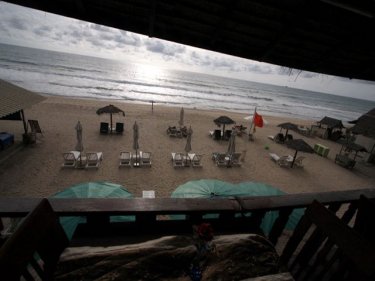








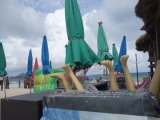
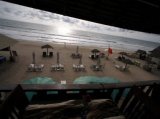


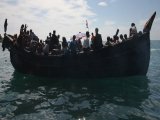

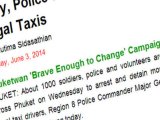
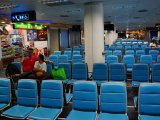




Most, if not all, of these Clubs have large premises on the 'right' side of the road - and they will continue to attract quality tourists, and I am sure that (Catch anyway) will survive. On the beach side of the road - I am also sure that potable bamboo tables and chairs will be acceptable - but not on the actual beach.
Posted by FrankieV on June 11, 2014 11:24
Editor Comment:
Past clearances have removed all structures. If the area was replanted and fenced off to be allowed to regenerate, there would be no speedy return. Best to wait and see.